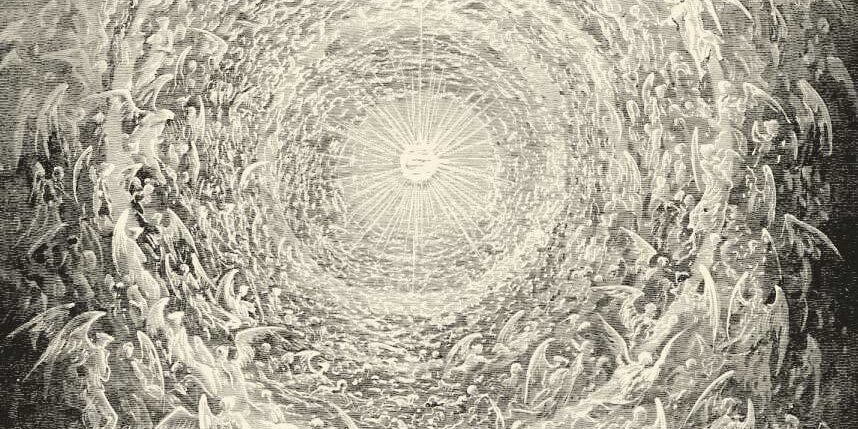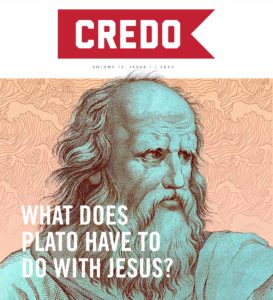
Further Up and Further In: Appreciating the Platonic Tradition and the Reformed Conception of Union with Christ
The latest issue of C redo Magazine focuses on Christian Platonism. The following is one of the issue’s featured columns by Samuel G. Parkison. Dr. Parkison is associate professor of theological studies and director of the Abu Dhabi Extension Site at Gulf Theological Seminary in the United Arab Emirates.
redo Magazine focuses on Christian Platonism. The following is one of the issue’s featured columns by Samuel G. Parkison. Dr. Parkison is associate professor of theological studies and director of the Abu Dhabi Extension Site at Gulf Theological Seminary in the United Arab Emirates.
In one of his lesser known works, The Discarded Image: An Introduction to Medieval and Renaissance Literature, C.S. Lewis paints a vivid picture of the Medieval imagination. He does this, in part, by contrasting the Medieval imagination with the modern one. Embodying these two radically different outlooks are two characters Lewis describes throughout the work: the medieval man and the nineteenth century man. He imagines both men walking outside and looking up at a clear night sky.[1]
Their situation is, externally, identical in every way. They are standing on the same ground, feeling the same breeze, and are captivated by the same display of stars—like flecks of white paint on a black canvas. But where the nineteenth century man imagines he is looking up at outer space, the medieval man imagines he is looking up into deep heaven. The Nineteenth century man views his world as full, and the sky as mostly empty. It is, essentially, nothing; its primary characteristic is absence. It is an unfathomable expanse of void. But where the nineteenth century man conceptualizes his star gazing as looking out, the medieval man imagines he is looking in. The blackness of the stars’ backdrop, for him, does not bespeak a fundamental emptiness, it rather instructs him on his own limitations. He does not assume that what he cannot see is not there; for him, the heavens are the province of a higher reality. They are not empty, they are full, teeming with life and activity that transcend his comprehension.Behind these two cosmological views are two opposing views of reality. This is what we mean when we talk about “metaphysics.” Click To Tweet
This description from Lewis helps us to illustrate the difference between the pre-modern enchanted cosmology and the modern disenchanted cosmology. Behind these two cosmological views are two opposing views of reality. This is what we mean when we talk about “metaphysics.” Metaphysics is concerned not merely with determining whether stars are burning balls of gas or angels (though, as Lewis points out, with the right metaphysic, even these two descriptions of “stars” are not mutually exclusive),[2] but rather with how to conceptualize reality as a whole. One metaphysic describes reality as a message, the other views it as an accident. The former produces thinkers like Jonathan Edwards, who doesn’t simply observe roses or spiders or water or silkworms, he reads them. Roses mean more than they are, they mean “that true happiness, the crown of glory, is to come at it in no other way than by bearing Christ’s cross by a life of mortification, self-denial and labor, and bearing all things for Christ. The rose, the chief of all flowers, is the last thing that comes out. The briery prickly bush grows before, but the end and crown of all is the beautiful and fragrant rose.”[3] The latter metaphysic, the disenchanted one, produces thinkers like Richard Dawkins, who says, “The universe we observe has precisely the properties we should expect if there is, at bottom, no design, no purpose, no evil, no good, nothing but blind, pitiless indifference.”[4]
Now, let’s give ourselves a thought experiment. Let’s suspend our modern disbelief for just a moment and imagine that Jonathan Edwards was right. What if our cosmos really was rife with layers of meaning for people to discover, rather than a mere accidental lump of matter? What if it wasn’t up to humans to impose meaning on a meaningless existence, but rather to uncover meaning that was truly there? What if roses in brier bushes truly meant something more than the material properties that make them up? Before we even begin to test the feasibility of such a belief, I’d like to appeal to that part of you that resides deep in the recesses of your mind that (perhaps secretly) wants this to be true. That part of you that, if entertained, would bring you to admit, “It’s too bad the world works like a mindless machine and isn’t full of magic. An enchanted cosmos would be nice. It would be so much more exciting.” Go ahead and humor me; let that part of you have the floor at least for a while.
Realism and Nominalism
As difficult as it is to imagine, the modern view of the universe is no forgone conclusion to Western thought. It was an accident. A mere decision to go left at a fork in a philosophical road where many great thinkers of the past went right. The proverbial fork is the choice between nominalism and realism. Nominalism is a very earthy outlook. It denies the existence of universals—which means something like, “abstract reality isn’t real.” For a nominalist, we’re not saying anything definite or concrete or real when we talk about “humanness” or “humanity.” There is no such thing as humanness, since any expression of so-called humanity is necessarily individual and distinct from all other expressions. “Humanity” is simply the shorthand conventional term we use to group all these individual creatures together—it’s an imaginary concept that is useful for intellectual sorting, but it has no metaphysical substance. So says the nominalist.For Plato, the individual expressions of reality in this world—the particulars—are individual participants in their true, transcendental “Forms.” Click To Tweet
The realist, on the other hand, insists on the reality of universals. The most significant realist in the ancient philosophical tradition is Plato. He is so significant, in fact, that it is not uncommon to use “realism” and “Platonism” as interchangeable terms. For Plato, the individual expressions of reality in this world—the particulars—are individual participants in their true, transcendental “Forms.” These “Forms” or “Ideas” existed in an ethereal realm apart from the material world in which you and I inhabit, but the world you and I inhabit, according to Plato, participates derivatively in this world of “Forms” or “Ideas.” The essence of an individual human is humanness—and that essence is real, and is not exhausted by the individual human. My wife and I are both truly human, but neither of us exhausts the essence of humanity. Rather, we participate in the essence of humanity, which is real and would exist regardless of whether we were ever born.
This insistence on the reality of universals—and the denial of nominalism—is an essential feature of the Platonic tradition. And although various figures in this list would articulate their “realism” with greater or lesser degrees of similarity, the Platonic-realism tradition would include intellectual juggernauts like Aristotle, Plotinus, Augustine, Pseudo-Dionysius, Boethius, and Thomas Aquinas. All of these figures insisted on the reality of universals, and this was generally the consensus for Western thought until the arrival of William of Ockham (1285-1347), who—at the risk of grossly oversimplifying—decided to give nominalism a go. With the redistribution of nominalism, the stage was set for skeptical materialism.
Christian Platonism is Christian
While the idea that nominalism leads to skepticism may seem like a leap, let me assure you that it is not. Christian realism has always insisted that universals are real and while they do not exist in this ethereal realm of the world of “Forms” or “Ideas,” they exist within the mind of God, which erases arbitrariness from the cosmos. But when universals are rejected, arbitrariness is all that is left. This is the essence of skepticism, and it is nominalism’s inevitability. Without universals, deduction is impossible, and certainty is rendered impossible by consequence (no deduction, no certainty). All that’s left is probability. This philosophical landscape, combined with the ever-increasing intellectual acceptability of viewing the world apart from God (i.e., with the disenchantment of Kantian “enlightenment”) made materialism all but inevitable. If God is no essential character in the drama of creation, and universals are mere conventional conveniences, what is left but mere matter? If there is a universal in this outlook, it must be matter. The many particulars that we interact with are no participants in their universal forms, they are rather mere isolated and distinct accretions of the same stuff.When universals are rejected, arbitrariness is all that is left. Click To Tweet
Now, many Christians know that this kind of materialism is wrong, but for the past couple hundred years, they have been trying to negotiate the disenchanted cosmos inevitably produced by nominalism with belief in God. And this is a mistake because God didn’t create the disenchanted cosmos of nominalism; indeed, the disenchanted cosmos of nominalism doesn’t exist. It’s a figment of a skeptical and deficient imagination. This is why our earlier thought experiment had a bit of emotional currency for that wonder-seeking part of you that modernity attempts to beat into submission. A part of you wants to believe that Edwards was right, that roses have transcendent meaning, and that the night sky isn’t empty but rather full.
So, let me just go right out and say it: the part of you that wants an enchanted cosmos is right. That’s a real soulish hunger that was created to be satiated, not starved. “He has made everything beautiful in its own time. Also, he has put eternity into man’s heart, yet so that he cannot find out what God has done from the beginning to the end” (Ecc. 3:11). It is our thinking that must catch up to our being.
We are not, however, left to merely follow intuitions in order to embrace this metaphysic. It is deeply consistent with what Scripture expressly teaches. David says that “The heavens declare the glory of God, and the sky above proclaims his handiwork. Day to day pours out speech, and night to night reveals knowledge. There is no speech, nor are there words, whose voice is not heard” (Ps. 19:1-3). Day and night, according to David, have something to say. They are declaring God’s message to all of creation—through them, God communicates his glory.
Consider Psalm 148 as well, which consists of a liturgical call to worship for everything that exists, including the non-conscious realities of the rain, the sun, the moon, sea creatures, beasts, creeping things, flying birds, mountains, hills, trees, fire, hail, snow, mist, and stormy wind. It’s hard to imagine how these creaturely realities could obey this call to worship except by simply existing within the pleasure of God. All this being the case, searching out in nature for various layers of meaning that harmonize with other layers of meaning is no great stretch of the imagination; in fact, it is the most natural thing in the world. The Author of nature is the same Author of redemptive history. Why would we not expect him to have thematic coherence in his work? This is precisely what Edwards is getting at when he writes,
Again, it is apparent and allowed that there is a great and remarkable analogy in God’s works. There is a wonderful resemblance in the effects which God produces, and consentaneity in his manner of working in one thing and another, throughout all nature. It is very observable in the visible world. Therefore ’tis allowed that God does purposely make and order one thing to be in an agreeableness and harmony with another. And if so, why should not we suppose that he makes the inferior in imitation of the superior, the material of the spiritual, on purpose to have a resemblance and shadow of them? We see that even in the material world God makes one part of it strangely to agree with another; and why is it not reasonable to suppose he makes the whole as a shadow of the spiritual world?[5]Plato was right about his insistence that universals are real, but he was wrong about where to find them. Click To Tweet
The cosmos Edwards inhabited was no nominalist cosmos because the cosmos of the Bible is not a nominalist cosmos. Plato was right about his insistence that universals are real, but he was wrong about where to find them. They didn’t exist in the abstract, ethereal, impersonal world of “Forms.” And so Augustine took Plato’s “Ideas” or “Forms” from their homeless wasteland and brought them home to the mind of God. That divine mind tells a providential story with the created universe, and at the pinnacle of providence’s story is the gospel of Jesus Christ. To embrace a realism that takes seriously the profuse multi-layered meaning of everything—finding a rich symbolism woven into the fabric of the metaphysical structure of the universe that images biblical doctrine—is simply to do justice to authorial intent and creative integrity.
Read the Full Article Here!
[1] While we’re on the subject of Lewis, I should point out that the title of this essay is coming from Lewis’s book, The Last Battle, which includes this constant refrain, “further up and further in,” as the heroes of the story enter in through the “stable door” of heaven and move further into Aslan’s country. Here’s what professor Digory says about it: “Listen, Peter. When Aslan said you could never go back to Narnia, he meant the Narnia you were thinking of. But that was not the real Narnia. That had a beginning and an end. It was only a shadow or a copy of the real Narnia, which has always been here and always will be here: just as our own world, England and all, is only a shadow or copy of something in Aslan’s real world. You need not mourn over Narnia, Lucy. All of the old Narnia that mattered, all the dear creatures, have been drawn into the real Narnia through the Door. And of course it is different; as different as a real thing is from a shadow or as waking life is from a dream.” His voice stirred everyone like a trumpet as he spoke these words: but [then] he added under his breath “It’s all in Plato, all in Plato: bless me, what do they teach them at these schools!” The Last Battle (HarperCollins, 1994), 105.
[2] Recall the conversation between the Narnian star, Ramandu, and Eustace: “‘In our world,’ said Eustace, ‘a star is a huge ball of flaming gas.’ ‘Even in your world, my son, that is not what a star is but only what it is made of.’ C.S. Lewis, The Voyage of the Dawn Treader (HarperCollins, 1994), 115.
[3] The Works of Jonathan Edwards (WJE Online), Vol. 11.3.
[4] Richard Dawkins, The Selfish Gene (Oxford University Press, 1978).
[5] The Works of Jonathan Edwards (WJE Online), Vol. 11.8.

